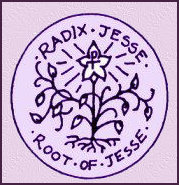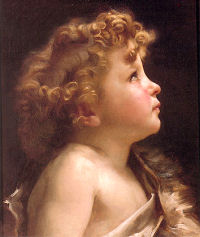Advent: December 19th
December 19, O Root of Jesse
Other Titles: Day 3 O Antiphons: O Radix Jesse (O Root of Jesse)
» Enjoy our Liturgical Seasons series of e-books!
Today is the Third of the O Antiphons, O Radix Jesse (O Root of Jesse). Christ the King, the Lord! Divine Wisdom, Adonai, the powerful God, is at the same time man with flesh and blood of the house of Jesse, the father of King David. Truly, the right of kingship has now passed from the house of David. The glory that once clothed the royal family has faded and withered, leaving only a blighted and withered root. But from this root is to spring a glorious blossom, the King of the world. "He shall rule from sea to sea and from the river unto the ends of the earth. Before Him the Ethiopians shall fall down and His enemies shall lick the ground. The kings of Tharsis and the islands shall offer presents: the kings of the Arabians and of Saba shall serve Him" (Ps. 71:8-11). To Him God has said, "Thou art My Son. . . . I will give Thee the Gentiles for Thy inheritance, and the utmost parts of the earth for Thy possession" (Ps. 2:7 ff).
The Roman Martyrology commemorates Pope Blessed Urban V (1310-1370). Pope Urban was a Benedictine monk. He was elected on September 28, 1362, and was the sixth pope of the Avignon papacy. Saints Bridget of Sweden and Catherine of Siena urged him to return to Rome. He did return to Rome in 1367, but was forced to return to France, where he died, clad in the habit of his Order (December 16, A.D. 1370). The papacy did not return to Rome until under the next pope, Pope Gregory XI in 1376.
For those following the Jesse Tree, you can either continue through Christmas Eve following Catholic Culture's Jesse Tree, or use symbols based on the “O” Antiphons (see Jesse Tree Instructions and O Antiphons).
![]() Jesse Tree, Day 19 ~ Daniel
Jesse Tree, Day 19 ~ Daniel
Jesse Tree Overview
O Root of Jesse
"Come to deliver us and tarry not." The world cries out for Christ its King, who shall cast out the prince of this world (John 12:31). The prince of this world established his power over men as a result of original sin. Even after we had been delivered from the servitude of Satan through the death of Christ on the cross, the prince of this world attempts to exercise his power over us. "The devil, as a roaring lion, goeth about seeking whom he may devour" (I Pet. 5:8). In these trying times, when faith in Christ and in God has largely disappeared, when the propaganda of a pagan culture is broadcast everywhere, and the forces of evil and falsehood rise up to cast God from His throne, who does not feel the power of the devil? Does it not appear that we are approaching that time when Satan will be released from the depths of hell to work his wonders and mislead, if possible, even the elect? (Apoc. 20:2; Matt. 24:24.)
"Come, tarry not." Observe how thoroughly the world of today has submitted to the reign of Satan. Mankind has abandoned the search for what is good and holy. Loyalty, justice, freedom, love, and mutual trust are no longer highly regarded. Establish, O God, Thy kingdom among us, a kingdom established upon truth, justice, and peace. "Come, tarry not." "Thy kingdom come."
—Excerpted from The Light of the World by Benedict Baur, O.S.B.
 3rd O Antiphon: O Radix Jesse (O Root of Jesse)
3rd O Antiphon: O Radix Jesse (O Root of Jesse)
Symbols: Plant with Flower
Come to deliver us, and tarry not.
Traditional Antiphon: O Root of Jesse, who stands for an ensign of the people, before whom kings shall keep silence and unto whom the Gentiles shall make supplication: Come to deliver us, and tarry not.
O Radix Jesse, qui stas in signum populorum, super quem continebunt reges os suum, quem gentes deprecabuntur: veni ad liberandum nos, jam noli tardare.
Vespers Antiphon: O Flower of Jesse's stem, you have been raised up as a sign for all peoples; kings stand silent in your presence; the nations bow down in worship before. Come, let nothing keep you from coming to our aid.
The flower which springs up from the root of Jesse is another figure of Christ. Isaiah prophesied that the Savior would be born from the root of Jesse, that He would sit upon the throne of David, and in Christ this prophecy is fulfilled.
Recommended Readings: Isaiah 11:1-12
![]() Today is Day Four of the Christmas Novena.
Today is Day Four of the Christmas Novena.
Pope Blessed Urban V
 Guillaume was born to the nobility, one of four children of Guillaume de Grimoard, Lord of Bellegarde, and of Amphélise de Montferrand; his brother later became a cardinal and papal legate. Guillaume became a Benedictine monk at the priory of Chirac, France in 1327. He was a priest, ordained at the Chirac monastery in 1334. He studied literature and law in Montpellier, France, and then law at the University of Toulouse, France. He received a doctorate in Canon Law on October 31, 1342, and was known as one of the most learned men of his day. Guillaume was appointed prior of Nôtre-Dame du Pré in the diocese of Auxerre, France by Pope Clement VI, then abbot of Saint-Germain en Auxerre monastery on February 13, 1352 and later was the Benedictine Procurator-General at the Papal court. He taught canon law in Montpellier, in Paris and in Avignon, France. His continued various roles: Vicar-general of the diocese of Clermont, France c.1350, the Vicar-general of the diocese of Uzès, France in 1357, papal legate in Italy several times, Abbot of the abbey of Saint Victor in Marseilles, France from August 1361 to 1362, advisor to Pope Innocent VI and Apostolic Nuncio in Italy.
Guillaume was born to the nobility, one of four children of Guillaume de Grimoard, Lord of Bellegarde, and of Amphélise de Montferrand; his brother later became a cardinal and papal legate. Guillaume became a Benedictine monk at the priory of Chirac, France in 1327. He was a priest, ordained at the Chirac monastery in 1334. He studied literature and law in Montpellier, France, and then law at the University of Toulouse, France. He received a doctorate in Canon Law on October 31, 1342, and was known as one of the most learned men of his day. Guillaume was appointed prior of Nôtre-Dame du Pré in the diocese of Auxerre, France by Pope Clement VI, then abbot of Saint-Germain en Auxerre monastery on February 13, 1352 and later was the Benedictine Procurator-General at the Papal court. He taught canon law in Montpellier, in Paris and in Avignon, France. His continued various roles: Vicar-general of the diocese of Clermont, France c.1350, the Vicar-general of the diocese of Uzès, France in 1357, papal legate in Italy several times, Abbot of the abbey of Saint Victor in Marseilles, France from August 1361 to 1362, advisor to Pope Innocent VI and Apostolic Nuncio in Italy.
Urban was sixth of the Avignon Popes; he took the name Urban saying that “all the popes who have borne this name were saints." As pope he eschewed the pomp of the throne, and continued to live by the Benedictine Rule, which led to opposition from courtiers who preferred a more regal life in court. He cut tithes in half, supported students, clerical training, seminaries and colleges, worked to re-unite Latin and Greek Christians, fought the heresies of the day, built churches and monasteries, restored many that had fallen on hard times or fallen away from discipline. He fought absentee bishops, bishops of multiple dioceses, and simony, founded a university in Hungary, restored the medical school in Montpellier, and approved the establishment of the University of Krakow. He preached crusade against the Viscontis in Italy, accusing them of theft of Church property. Preached crusade against the Turks in 1363, but little came of it as many of the leaders died of natural causes before troops could be put into the field.
Urged by Saint Bridget of Sweden and by Saint Catherine of Siena to return the papacy to Rome, he moved his court back to Rome, entering the city on October 16, 1367, the first pope to do so in 60 years. He was met by jubilant Romans and clergy. He re-discovered relics of Saint Peter and Saint Paul the Apostle in the papal chapel of the Lateran basilica when he prepared to say Mass there onMarch 1, 1368; they were later placed and new reliquaries and enshrined. However, outbreaks of plague and violence in the city led him to return to France, arriving there on September 24, 1370. He fell ill soon after, and his remaining weeks were ones of physical decline. He died on December 19, 1370 at Avignon, Papal States. He is the only Avignon pope to be beatified.
—Adapted from CatholicSaints.info
Highlights and Things to Do:
- Read more about Pope Urban V:
- Pope Urban's relics are located in the former Abbey church of Saint-Victor in Marseille, France.






